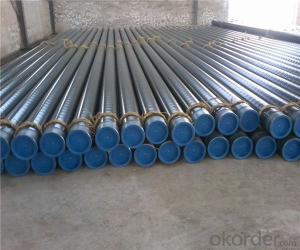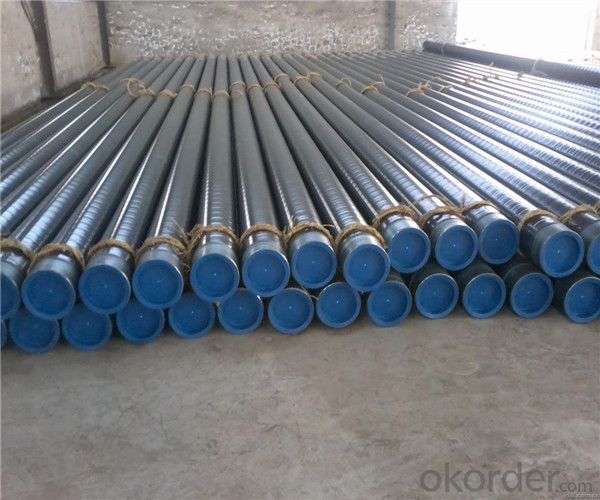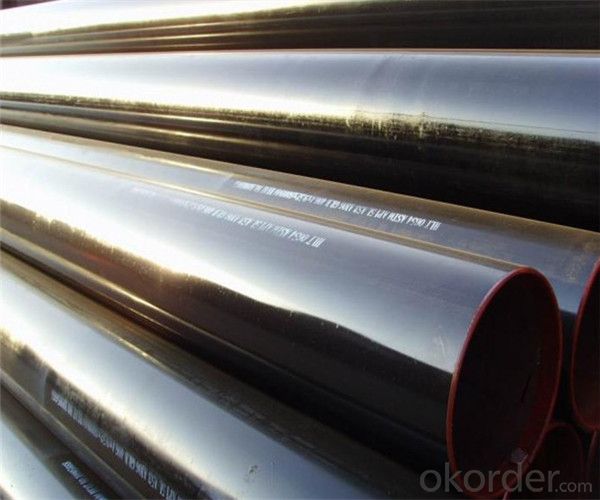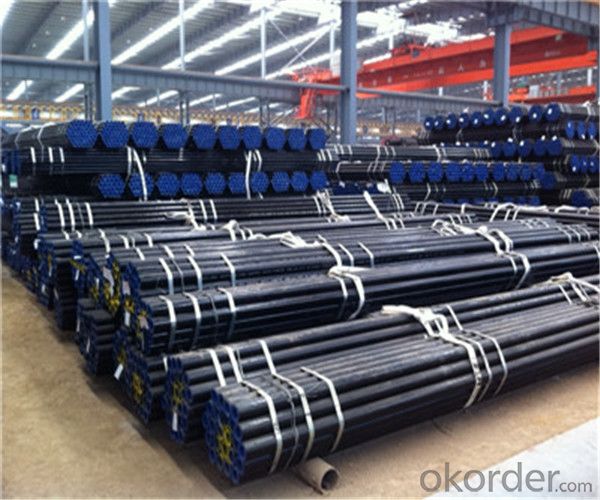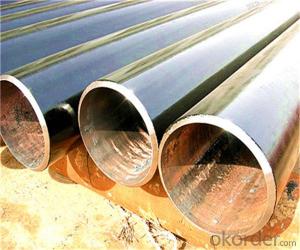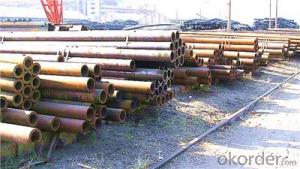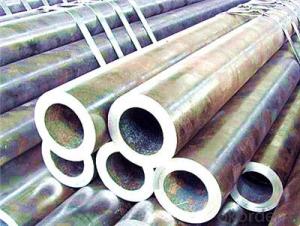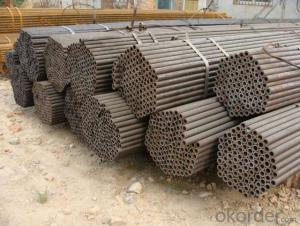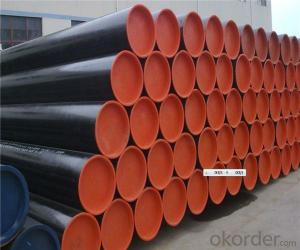Seamless Steel Pipe High Quality/Factory Price
- Loading Port:
- Tianjin
- Payment Terms:
- TT OR LC
- Min Order Qty:
- 50 m.t.
- Supply Capability:
- 3000000 m.t./month
OKorder Service Pledge
OKorder Financial Service
You Might Also Like
PRODUCT DETAILS
1.Structure of Seamless Steel Pipe Description:
A large amount of Seamless Steel Pipes is offered to the clients at cost effective rates. These pipes are extremely durable, resistant to corrosion and have high tensile strength. Our pipes are used in nuclear plants, power plants, refineries and construction industry across the country. Furthermore, we are capable of providing these seamless pipes to the clients in bulk quantity.
2.Main Features of the Steel Pipe:
• High manufacturing accuracy
• High strength
• Small inertia resistance
• Strong heat dissipation ability
• Good visual effect
•Reasonable price
3.Packaging & Delivery:
| Packaging Details: | Seaworthy packages, bundles wrapped with strong steel strip |
| Delivery Detail: | 15-30 days after received 30% TT |
4.Seamless Steel Pipe Specification:
| Standard: | GB, DIN, ASTM,ASME, ASTM A106-2006, ASTM A53-2007 |
| Grade: | 10#,20#, 45#, 16Mn |
Thickness: | 8 - 33 mm |
| Section Shape: | Round |
| Outer Diameter: | 133 - 219 mm |
| Place of Origin: | Shandong, China (Mainland) |
| Secondary Or Not: | Non-secondary |
| Application: | Hydraulic Pipe |
| Technique: | Cold Drawn |
| Certification: | API |
| Surface Treatment: | factory state or painted black |
| Special Pipe: | API Pipe |
| Alloy Or Not: | Non-alloy |
| Length: | 5-12M |
| Outer Diameter: | 21.3-610mm |
5.FAQ of Seamless steel pipe:
①How is the quality of your products?
Our products are manufactured strictly according to national and internaional standard, and we take a test
on every pipe before delivered out. If you want see our quality certifications and all kinds of testing report, please just ask us for it.
Guaranteed: If products’ quality don’t accord to discription as we give or the promise before you place order, we promise 100% refund.
②How about price?
Yes, we are factory and be able to give you lowest price below market one, and we have a policy that “ for saving time and absolutely honest business attitude, we quote as lowest as possible for any customer, and discount can be given according to quantity”,if you like bargain and factory price is not low enough as you think, just don’t waste your time.Please trust the quotation we would give you, it is professional one.
③Why should you chose us?
Chose happens because of quality, then price, We can give you both.Additionally, we can also offer professional products inquiry, products knowledge train(for agents), smooth goods delivery, exellent customer solution proposals.Our service formula: good quality+good price+good service=customer’s trust.
SGS test is available, customer inspection before shipping is welcome, third party inspection is no problem.
Any question, pls feel free to contact us !
- Q: Can steel pipes be used for underground water supply?
- Indeed, steel pipes possess the capability to be employed in the provision of underground water. Due to their robustness, durability, and resistance to corrosion, steel pipes prove to be appropriate for a wide range of uses, including underground water supply. Nonetheless, it is imperative to utilize steel pipes that are explicitly manufactured for underground purposes and are furnished with a protective coating or lining to thwart corrosion. Furthermore, the installation and upkeep of these steel pipes must be conducted diligently to guarantee their long-term resilience and effectiveness within an underground water supply system.
- Q: Outside diameter 60, thickness 3.5 seamless steel tube, how many kilograms per meter?
- Steel tube Kg/m (including seamless steel tubes and welded tubes) theoretical formula per meter weight: W=0.02466 * S * (D-S)Of which: S - wall thickness (mm), D - steel tube diameter (mm), W - kg / M
- Q: Can steel pipes be used for transportation of hazardous materials?
- Steel pipes can indeed be used for the transportation of hazardous materials. Steel is known for its strength, durability, and resistance to corrosion, making it suitable for handling and transporting a wide range of hazardous substances. This includes flammable liquids, toxic chemicals, and other dangerous materials. Steel pipes used for the transportation of hazardous materials are often specially designed and constructed to meet stringent safety regulations and industry standards. They are typically made from high-quality steel alloys and undergo rigorous testing to ensure their integrity and resistance to leaks or ruptures. Furthermore, steel pipes can be manufactured with additional protective coatings or linings to provide an extra layer of security and prevent any potential reactions between the hazardous material and the steel. These coatings can also help to minimize the risk of corrosion and extend the lifespan of the pipes. Overall, steel pipes have a proven track record in the transportation of hazardous materials due to their inherent strength, durability, and ability to withstand the harsh conditions often encountered during transportation. However, it is crucial to follow proper handling, storage, and transportation protocols to ensure the safety of both the materials being transported and the individuals involved in the process.
- Q: What are the advantages of using steel pipes in the manufacturing of appliances?
- There are several advantages of using steel pipes in the manufacturing of appliances. Firstly, steel pipes offer high strength and durability, ensuring a long lifespan for the appliances. Secondly, steel pipes have excellent corrosion resistance properties, which is crucial in appliances that come into contact with water or other corrosive substances. Thirdly, steel pipes can withstand high temperatures, making them suitable for appliances that generate heat. Additionally, steel pipes provide a smooth and efficient flow of fluids or gases, enhancing the overall performance of the appliances. Lastly, steel pipes are readily available and cost-effective, making them a preferred choice for manufacturers.
- Q: Can steel pipes be used for underground water supply networks?
- Yes, steel pipes can be used for underground water supply networks. Steel pipes are durable, resistant to corrosion, and have high strength, making them suitable for carrying water underground. Additionally, steel pipes can withstand high pressure and temperature variations, ensuring a reliable and long-lasting water supply system.
- Q: Can steel pipes be used for conveying hydraulic fluids?
- Yes, steel pipes can be used for conveying hydraulic fluids. Steel pipes have high tensile strength and excellent resistance to high pressure, making them suitable for hydraulic applications. They can withstand the high operating pressures and temperature fluctuations that hydraulic systems often experience. Additionally, steel pipes are durable and have a long lifespan, ensuring reliable and efficient fluid transmission in hydraulic systems. However, it is important to ensure that the steel pipes used are compatible with the specific hydraulic fluid being conveyed to prevent corrosion or degradation of the pipe material.
- Q: How are steel pipes used in the construction of solar power plants?
- Steel pipes are used in the construction of solar power plants for various purposes, including the installation of solar panels, mounting structures, and the transportation of fluids such as water and steam within the plant. These pipes provide strength, durability, and corrosion resistance, making them an essential component in the construction and operation of solar power plants.
- Q: Can steel pipes be used for offshore oil and gas platforms?
- Offshore oil and gas platforms can utilize steel pipes, as they are known for their durability, strength, and ability to withstand harsh marine conditions. These pipes are typically constructed from high-quality steel alloys, capable of enduring the immense pressures and temperatures of offshore drilling and production activities. Moreover, steel pipes offer versatility and easy welding, facilitating the creation of intricate pipeline networks on offshore platforms. Furthermore, protective coatings like epoxy or anti-corrosion coatings can be applied to steel pipes, bolstering their resistance to corrosion and extending their lifespan in the offshore environment. In summary, steel pipes are a reliable and extensively employed option for transporting oil and gas on offshore platforms.
- Q: How are steel pipes repaired if they develop leaks?
- Steel pipes can be repaired if they develop leaks through various methods such as welding, clamping, or using epoxy compounds. The specific repair technique depends on the size and location of the leak as well as the type of pipe, and it is typically carried out by trained professionals with the necessary equipment and expertise.
- Q: 45 and 316 which steel tubes are of high hardness?
- No. 45 steel for high-quality carbon structural steel, the hardness is not high machining, used to make the template, mould studs, guide column, subject to heat treatment. 45 steel quenched and tempered hardness between HRC20~HRC30; 45 steel quenching hardness between HRC55~58, the limit value of up to HRC62.
Send your message to us
Seamless Steel Pipe High Quality/Factory Price
- Loading Port:
- Tianjin
- Payment Terms:
- TT OR LC
- Min Order Qty:
- 50 m.t.
- Supply Capability:
- 3000000 m.t./month
OKorder Service Pledge
OKorder Financial Service
Similar products
Hot products
Hot Searches
Related keywords
